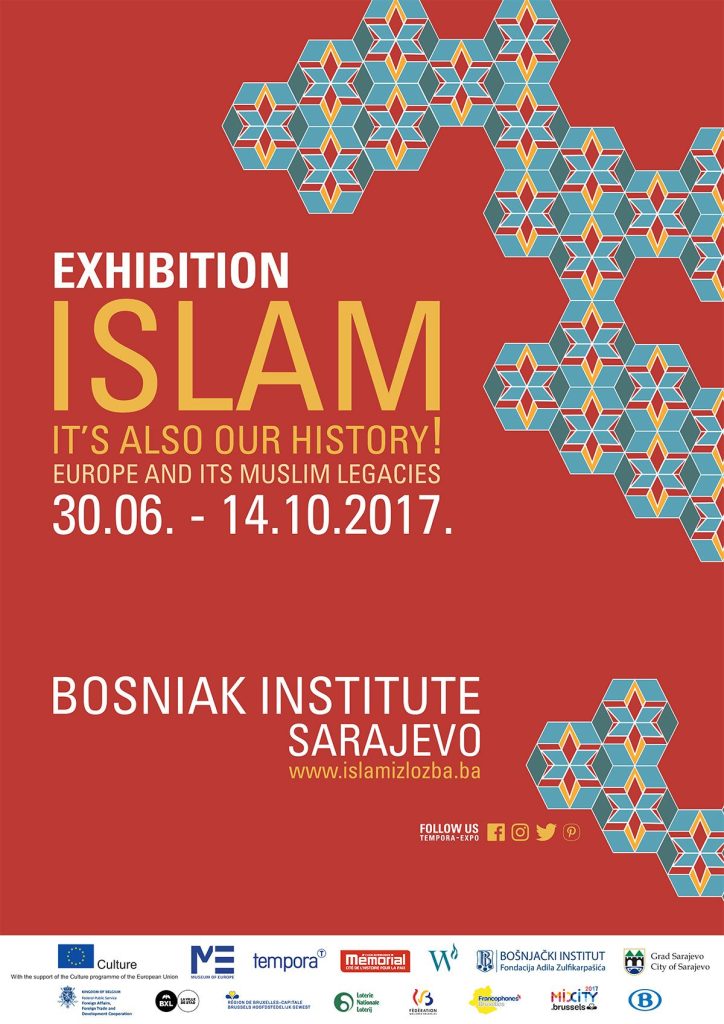
Islam, It’s Also Our History! – Europe and its Muslim Legacies – Bosniak Institute
This exhibition is not a work of circumstance. It has been included in the programme of the Museum of Europe since its origin, seventeen years ago, and has continued to haunt the minds of members of our association.
It also addresses a fundamental concern – the study of European relations, taken as a whole, both inter- nally and externally, and takes its place in a series bearing the statement “It’s our history”: “Europe, it’s our history”, “America, it’s our history”, and now Islam. “Islam”, with a capital letter since this term not only denotes a religion but also a civilisation.
It turns out that our exhibition comes at a very relevant time in history when the meeting between Europe and Islam is witnessed by citizens from the continent in all its tragic manifestations – massive and chaotic waves of immigration, senseless terrorist violence, feelings of alienation, incomprehension and hostility.
Should we cancel it or at least postpone it until happier circumstances? De nitely not, we believe. It is precisely because the timing is tragic that it is important to show our contemporaries the extraordinary richness of this history, which has helped to make us what we are. We should not hide what is wrong any more than relativize it, but place it a centu- ries-old history, which has much more to it than just this.
After all, do we imagine a history of Europe reduced to wars between its nations?
In the European imagination, both Muslim and non-Muslim, there is a stubbornly rooted idea that the Muslim presence on European soil is a late import, dating from the waves of immigration of the second half of the twentieth century. This results in another preconceived notion: that these two civilisations, Europe and Islam, are fundamentally foreign to one another, and condemned by the vicissitudes of history to coexist uneasily with one another.
The exhibition ‘Islam, its also our History’ shows that this is completely wrong. Far from being a recent presence, Islam has never been absent from Europe and European civilisation since it rst burst onto the stage of history.
The Muslims arrived in the Western part of the Mediterranean in the eighth century with the conquest of the Iberian Peninsula, where they remained for seven centuries. By the time that the fall of Granada in 1492 brought an end to the Muslim presence in the West of the continent, the Turks had already been well established for over a century in the East, in the Balkans, which they incorporated into a vast empire. Just as there is a North African Islam, a Turkish Islam, an African Islam, an Indo-Pakistani Islam, an Arabic Islam and an Indonesian Islam, so too there was – and still is today – a speci cally European Islam.
So can we talk of two civilisations that are foreign to one another? No, Europe and Islam are two civilisations which have sometimes been in con ict with one another, to be sure, but which come from a common spiritual and intellectual core, tracing the same scriptural origins and claiming the same philosophical heritage. The twelve-century story of their involvement with one another has been violent at times, peaceful at other times, but always rich in mutual in uences. Without their encounter, neither Europe nor Islam would be what they are today.
Amid the ow and ebb of territorial advances and retreats over the centuries, this exhibition revisits this history, which, for better or for worse, is our common heritage and in which we all play a part.
Partners: Tempora, Museum of Europe, Caen-Normandy Memorial, WARM Foundation
EVENTS
- ‘Islam, It’s Also Our History!’ Exhibition
WARM Festival 2017, 28th June – 2nd July 2017, Sarajevo - Discussion with Eli Barnavi and Isabelle Benoit (Tempora), Thursday 29th June 2017, 17:00, Kino Meeting Point, Sarajevo
- Exhibition Opening by Elie Barnavi (Tempora), Olaf-Gamal Deussen (EU Delegation B&H), Amina Rizvanbegović-Džuvić (Bosniak Institute) and Rémy Ourdan (WARM), Thursday 29th June 2017, 19:00, Bosniak Institute, Sarajevo
https://warmfoundation.org/event/2017-06-28-warm-festival-2017